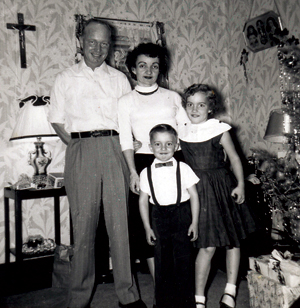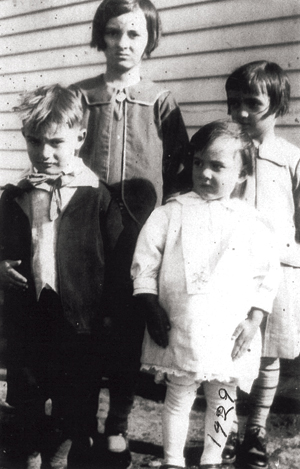The Autobiography of Clementine B. Barthold: She Did It Her Way

You might call retired Judge Clementine “Tiny” Barthold a late bloomer. She graduated from law school at 59, was elected judge of Clark Superior Court at 61, and published her autobiography last year at the age of 91.
But you would never call her retiring.
She was the first female probation officer in Clark County, the first institutional parole officer at the Indiana Women’s Prison in Indianapolis, and the first female judge in Clark County. As judge, she challenged the constitutionality of a state law that would have prevented her from seeking re-election after age 70—and retired anyway, even though the law was changed.
She’s not shy with her opinions, either, whether it’s a woman’s right to practice contraception, women’s struggles against male prejudice, or her frank acknowledgment of two difficult marriages.
Judge Tiny’s Journey relates all that and more in a direct, “as-told-to” style leavened with an occasional flourish. The aurora borealis looks like “billowing curtains of ever-changing light,” while her post-marriage romances are “red-hot love affairs.”
“Well, I’m trying to be honest, be realistic and to tell it like it is,” Barthold said during a recent phone interview. “My friends who’ve read it say, ‘Tiny, it’s just like you’re talking to me.’”
(The sobriquet is doubly diminutive, reflecting both a shortened first name and Barthold’s four-foot-eleven-inch stature.)
Barthold was born Klementina Schwan in Ukraine in 1921, an era of famine and civil war that found her father on the losing (non-Bolshevik) side. Yet her German-Russian family managed to emigrate to Canada and then the United States in 1925, where they lived for 15 years before deportation back to Canada for lack of proper documents.

A judge in Aberdeen, S.D., where the Schwans had made their home, helped ease their re-entry in 1941, the same year that Clementine (now with an Anglicized spelling) married a local ranching scion and geologist named Eddie Barthold. Eddie’s job with the U.S. Geological Survey involved frequent assignments around the country, including Jeffersonville, where Barthold still lives in the house they bought in 1955.
In many respects, Judge Tiny’s Journey tells the familiar story of poor yet industrious immigrants who struggled to master bewildering new circumstances, including English. Quotidian details abound (first date, first kiss, first job), but so do Barthold’s ruminations on the importance of family, on work and opportunity, and on women’s particular gifts and changing roles.
She writes of her work at the women’s prison: “The issue of full equality for women was still pretty new then, and the reality was that most people found it hard to shake preconceived notions of a ‘good woman’ and a ‘bad woman.’”
About her attempts, as judge, to wrest county funds for a public defender, she wrote: “Some people interpreted that to mean that I was soft on crime. In my opinion, I was strong on fairness … and the presumption of innocence.”
Barthold didn’t plan her passage from 1950s-style housewife to judge, but was ferried there by what she calls “a series of different incidents that developed into important parts of my life.”

The first was volunteer work at the Chamber of Commerce, where she rubbed shoulders with community leaders. That led to secretarial employment at the county parole office and her eventual appointment as acting probation officer when her boss retired in 1964. “Acting” soon became actual – though with less pay and staff than her predecessor – and by 1965 she was named chief probation officer.
“The juvenile crime that I confronted was mild by today’s standards,” she writes, yet prevailing practices often meant jail time for young offenders, with neither sight nor sound separation from jailed adults.
Barthold chose a different path. “Our focus was on prevention, treatment and rehabilitation of juvenile offenders, and the use of incarceration only when appropriate.” Over time, her approach gained traction. She helped launch the Clark-Floyd Youth Opportunity Center in 1971 and testified in 1972 before a U.S. Senate subcommittee on juvenile delinquency.
But not all was well. “Our marriage was off its moorings,” she writes, as Eddie’s alcoholism intensified and she poured all her energies into work. Then the unexpected happened. Eddie died in an Ohio River boating accident in 1972 and, also that year, “her” judge and mentor lost the Democratic primary. The entire probation staff resigned and Barthold faced an uncertain future.
“I wanted to leave the chapter on Eddie out,” Barthold says, but she agreed after her editor insisted and her adult children approved. “It was very, very hard,” she says.
As Barthold tells it, the upheavals of 1972 were ultimately liberating. She resumed her education, which Eddie had always opposed, and launched a new career at the Indiana Women’s Prison. In alternating chapters, Barthold writes of personal developments (“my red-hot love affair” with her soon-to-be second husband) and educational ambitions that culminated in law school graduation and bar admission in 1980.
She was 59.
Barthold briefly traced a conventional path as she returned to Jeffersonville to open a solo law practice. But her heart remained in juvenile justice, and the tugs grew stronger as local courts mothballed programs and practices that she believed in.
By 1982 she resolved to challenge an incumbent Superior Court judge in the Democratic primary, with or without the support of party bosses. Barthold quickly learned it would be “without,” supposedly because Clark County was not yet ready for a female judge.
The primary and general elections proved otherwise, which Barthold attributes to women voters. “It was the women that got me elected and supported me wholeheartedly,” she says. “It wasn’t the party.”
Few people in public office can claim unqualified success, and Barthold doesn’t pretend to. But she was honored repeatedly during her 12 years in office, and later won election to the Clark County Council.
Judge Tiny’s Journey spends relatively little time on judicial honors. But Barthold writes delightedly about her 1984 appearance on “The Today Show,” which invited her for winning a national “Wonder Woman Award” honoring 14 successful women over 40.
She also delights in chaste but enthusiastic descriptions of her many romances, including current beau Herbert Anderson. “He’s the kindest, most thoughtful, caring man I’ve ever met,” she says, but quickly adds, “no more marriage, period.”
Given its detailed chronology, Judge Tiny’s Journey only rarely conveys the whirlwind quality of Barthold’s life, which she briskly exudes in conversation. Readers will also find that it suffers from vague chapter titles and the lack of an index.
Whatever its faults, Barthold’s autobiography is an insightful chronicle of one woman’s rise from obscurity to prominence, with a special focus on women’s changing roles in changing times.
“All I can tell you is I just told it as I remember it happening,” she says.